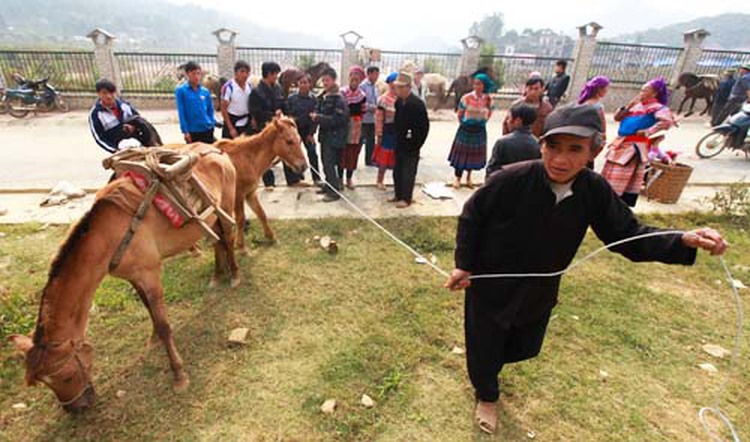
Not only is it a means of transport, the horse is also a friend and an important part of the culture of the Mong ethnic group in the northern province of Lao Cai.
Every day horses walk up steep hills to help Mong families carry agricultural tools to their farms while the grass and trees are still wet from dew under low temperatures. They will then carry the people and their tools back home.
On market days, agricultural products are often loaded on horseback or horse carts to be carried to the market for sale.
At the market, women buy and sell the products, while men organize brief contests to select the fastest and strongest horse.
On the way home from the market, horses also carry drunken men while their wives walk alongside.
If a man is too drunk to ride his horse, his wife will help him get off the horse and rest under a tree until he becomes sober. The horse and wife normally wait for him in the meantime.
The Mong people believe that the horse is the only animal that can incarnate itself to become a stretcher and lead the soul of a dead person to heaven.
Horses also represent the strength of a man and a faithful friend, according to Mong proverbs.
However, members of the ethnic group consumes horse meat as well, and processes it into a dish known across Vietnam as “thắng cố” – a kind of horse meat pot-au-feu cooked with different spices unique to the Mong region.
The Mong community names their horses after the places they live in, such as “Má Lao Chải,” which means the old horse camp, and “Si Ma Cai,” for the new horse market.
Statistics show that Lao Cai’s Bac Ha District has the most horses in the northern region, though the number has recently fallen.
Today there are 3,000 horses, down from 8,000 in 2003.
The animals have been replaced by a Belarusian-made motorbike, the Minsk, which makes transport easier in mountainous regions.

A member of the Mong community checks the teeth of a horse to guess its age (Photo: Tuoi Tre)

An owner holds his young horse, which is going to the market for the first time (Photo: Tuoi Tre)

Giang Thi Di in Bac Ha District feeds corn to her two horses (Photo: Tuoi Tre)

Sung Sa Sung tries riding a horse to check its health before purchasing the animal (Photo: Tuoi Tre)

Giang Thi Vang and her three-year-old horse (Photo: Tuoi Tre)

A corner of the Bac Ha horse market (Photo: Tuoi Tre)

The price for a horse ranges from VND8-15 million (US$385 – 721), depending on its age. Normally, a female horse is more expensive than a male because they are tamer (Photo: Tuoi Tre)




Two male horses fight for a female (Photo: Tuoi Tre)


Max: 1500 characters
There are no comments yet. Be the first to comment.